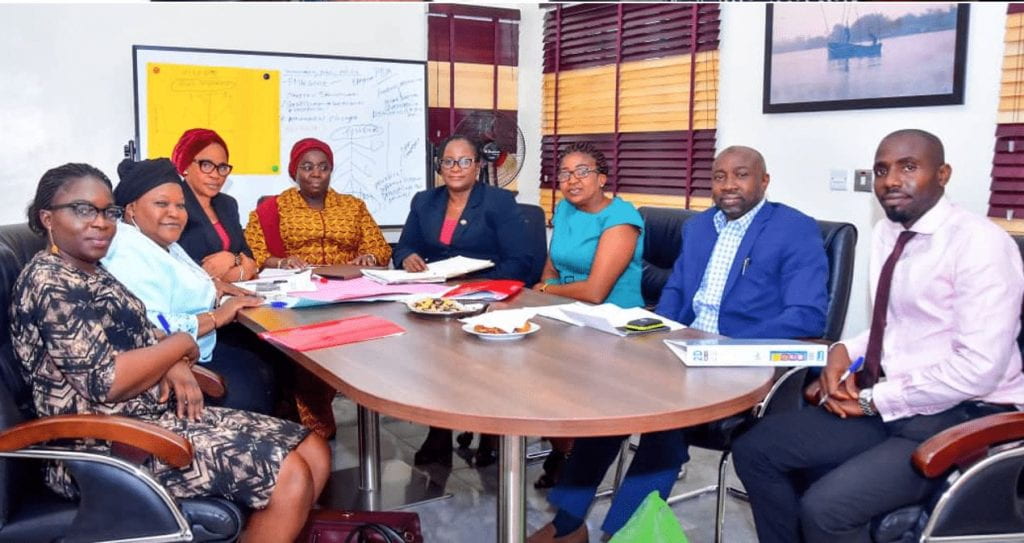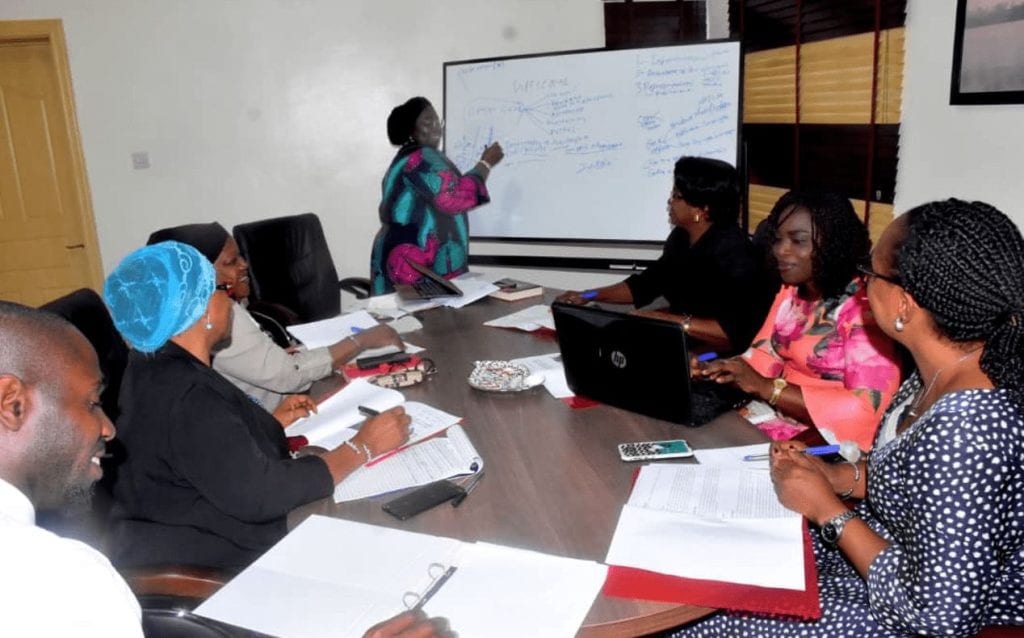Guest blog written by Idiat Adebule

At some points in one’s life, certain decisions are made without necessarily knowing the outcome, such was my experience whilst on the Implementing Public Policy Programme. Having worked at the heart of government at the state level for eight consecutive years; first, as the Secretary to the State Government (2011-2015) and later as the Deputy Governor of Lagos State (2015-2019); I have witnessed different cycles of public policy formulation which are usually targeted at addressing societal challenges. Many have been very successful, a few have failed to meet its objectives, whilst some are still at different stages of policy development which include the State Policy on Civic Engagement whose implementation office was under my supervision up until May 2019.
However, as I was preparing to exit office, the obligation and interest to continue to contribute intellectually to the real issues of development of the state motivated me to sign on to the IPP course. Hence, it was a choice made majorly to enhance personal growth and development as well as expand my frontier of learning beyond my field of study, therefore, choosing HKS was an easy call to make considering its global reputation and capacity. Interestingly, the experience has been life changing having encountered new and innovative learning methods that challenges the mind to do more of continuous personal reflection, reassessment and developing sustainable solution to problems.
The main kernel of my work was to interrogate the impact of “Effective Public Participation in the Governance Process”. The intention was to engage members of the public to find agreeable and acceptable modes and platforms of engagement that will open up space for majority of citizens to effectively participate in the electioneering, policy formulation and governance processes, especially for a state with population estimated at 22 million in a way that highly significant number of this population will participate and not only showing interest which are not the same as grasped in the course of the field work. Of great concern, were figures recorded during the February, 2019 general elections in Lagos State which revealed voter apathy as less than 1.2million out of 6.59million registered voters (18.9%) participated. The implication was that only about 5% of the total population of the State decided those who will govern it at both legislative and executive arms of government leaving out a huge number of eligible citizens that could have increased the data or made a difference.
Against this background, the IPP programme offered an opportunity to learn from authorities on public policy implementation who have moved away from the traditional project methodology to an innovative approach called the Problem Driven Iterative Adaptation (PDIA) in solving the most intransigent policy problems around the world. Indeed, the meeting sessions in Boston were moments of illumination and empowerment for participants that are already dealing with policy design and implementation issues and a good integration for participants who are new to the subject. In summary, it offers genuine prospect for building capability.
With exposure to PDIA approach of solving policy issues, a functional and supportive work team comprising 5 officers of the Office of Civic Engagement, 2 volunteers set to work to deconstruct the public policy problem. Relevant and appropriate problem-solving techniques like the 5-WHYs techniques and Triple-As change space analysis were used to deconstruct the problem. The fishbone diagram, a diagnostic tool from where you visualise all of the entry points was utilized to simplify the root cause analysis discussion and brainstorming for possible causes of the problem. The progression of digging deeper to find the root causes until all the ideas have been exhausted gave the opportunity for culture of continuous improvement and development of problem-solving skills which fulfilled a crucial purpose for embarking on the course.
In crawling the design space for possible solutions, the starting point was identifying the entry points and navigating through them using the problem driven sequencing strategy. The team engaged with stakeholders within the communities, sampled opinions through verbal interviews, series of meetings, online dialogue with the citizens on electronic and social media platforms, all in a bid to delve deeper into the problem.
This collaborative dissection of the problem together with potential beneficiaries who have experienced the problem first-hand was an innovative engagement mode which was one of the lessons of the PDIA approach and was well received and appreciated by the different communities. At the end of the exhaustive process, the team members and I transited from the problem analysis phase with different perspectives to the problem and our minds have been developed and broadened to proactively proceed to the next phase, which confirms the PDIA approach as a very insightful experience.
Furthermore, the outcome of the interrogation of the problem revealed against expectation that members of the public were indeed, not only willing to participate in the governance process but also value the opportunity to interact with government on policy issues. They maintained that there should be a platform for regular engagement beyond the existing Citizen’s Gate Online App, Town Hall meetings and Legislative public hearings which were all ad-hoc arrangements. The people desired to be involved in the policy formulation process rather than being considered as passive participants or just recipients of policy decisions. Thus, an institutionalised grassroot and community-based engagement was canvassed.
The period of iteration was a major learning curve for the team. It was a time to continually review, repeat and use evidence gathered to improve the quality of work and activities needed to achieve our set goal which was to develop a viable and relevant solution to the problem of Public Participation in Governance Process (PPIGP) and progressively improvefunctionality and legitimacy of public governance. Motivation for the team members to continue to stay inspired throughout the iterative process became crucial and it majorly derived from the determination to remain focused on the goal, persistence with high energy level, knowledge sharing, constant review of feedbacks, respect for differences in opinion and above all the opportunity of career improvement through the unique experience of participation.
The strategy adopted to ensure legitimacy for this work was to grow the change space, that is, to expand the number and levels of authorizers to ease the process and avoid burn out. This move became necessary because this work was being undertaken at the beginning of tenor of a new government (an agenda setting period) and getting the attention of the main authorizer was an uphill task considering his schedule and timing. This uncertainty was neither envisaged nor prepared for, but was surmounted by expanding the stages of authorization which turned out to be a helpful decision and morale booster as the implementation of our reform proposition was fast tracked. It also created the window to update the authorisers on the status and progress of work at every milestone attainment in an effort to ensure the work makes impactful contributions to the state’s policy reform.

The PDIA approach has useful lessons and benefits for people working on policy design and implementation and could potentially add value as follows:
- Build capabilities and capacity within the public sector with highly skilled work force that will have the competence for bottom-up policy development, implementation and monitoring/ evaluation as well as sustainability of government policies at any level.
- Strengthen and promote strategic alignment, collaborations, communication and engagement amongst Ministries, Departments and Agencies of government.
- Build and provide skills and tools which are needed to help resolve life problems/ challenges confronting the people as against ready-made solutions which more often than not do not consider peculiarities and contexts of beneficiaries. If solutions are home grown, team members will be able to align government policies and priorities to public interest.
- Equip the public service to be able to manage the influence of external consultants whose high cost of engagement impact negatively on government budgets and spending. PDIA therefore, speaks to effectiveness in public spending in a way that adds value to the citizens.
Valuable Lessons from the Course.
Implementing Public Policy programme offered a life changing experience of acquiring innovative skill of PDIA approach to developing sustainable solution to problems which was a re-energizer for me.
PDIA provides opportunity to learn and re-learn, experiment, discover and mobilize actors to find solution to complex challenges. Furthermore, it opens the mind to new options, nurture new ideas and has the capacity to contribute to solving real world problems with change in policy that is inclusive.
In conclusion,the HKS faculty members were amazing and ready to provide guidance at every step all through the journey. From the beginning they left us with clear ideas of what the IPP programme offers which was capacity building and unlocking the potential in others using the PDIA approach. How else can I appreciate these wonderful people other than to say “Thank you Matt Andrew, Salimah, Anisha, Amber, Susan and others”. I also appreciate members of my study group and work team for being part of the success of this work. This was indeed a great experience.
This is a blog series written by the alumni of the Implementing Public Policy Executive Education Program at the Harvard Kennedy School. Participants successfully completed this 7-month blended learning course in December 2019. These are their learning journey stories.
To learn more about Implementing Public Policy (IPP) watch the course and testimonial video, listen to the podcast, and visit the course website.